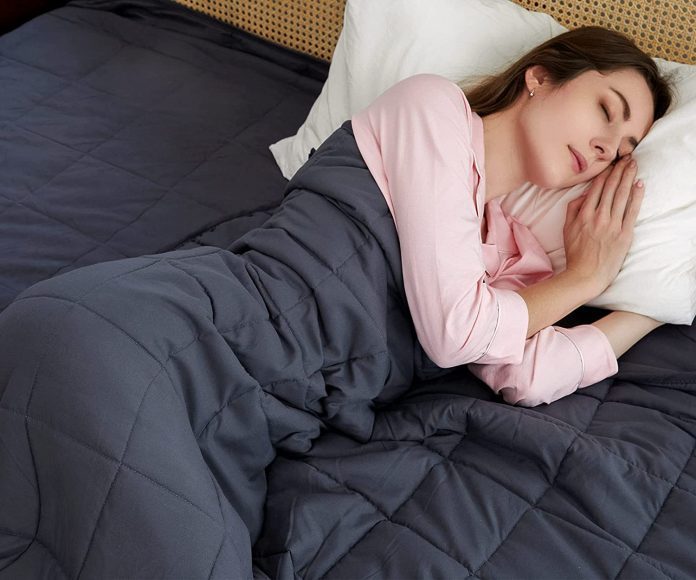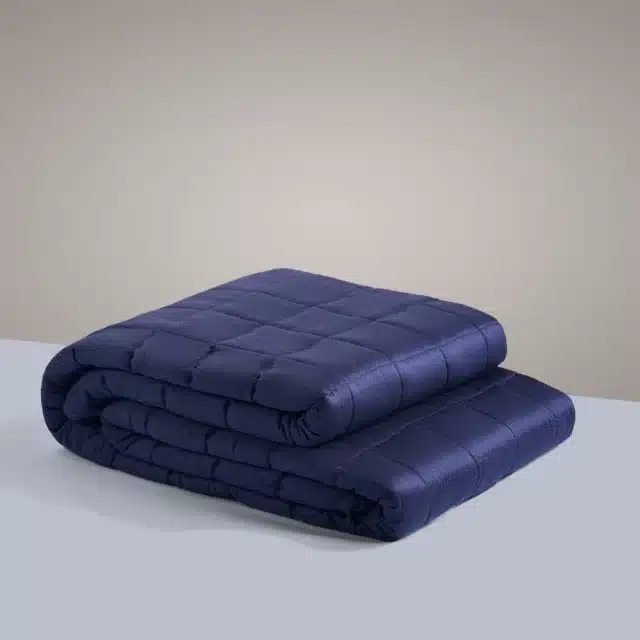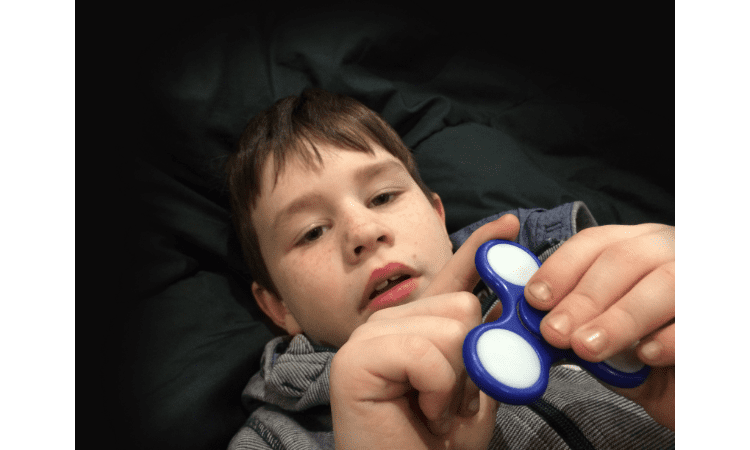
A weighted blanket is a blanket with a layer of plastic pellets, glass beads, or other material sewn into the interior. They are often used in occupational therapy for people with autism and ADHD, but there is also evidence that regular use can help to improve sleep quality and reduce anxiety.
In this article, we’ll look at the science behind using weighted blankets on a daily basis and discuss how weighted blankets can be used as part of an overall health recovery plan from anxiety, stress, and insomnia.
What are weighted blankets?

A weighted blanket is a blanket filled with multiple layers of pellets, beads or beans. The weight is distributed evenly across the entire surface area of the blanket to provide therapeutic benefits for stress relief and sleep. Weighted blankets can be purchased in any size, from twin to king-sized, and have removable covers that are machine washable.
The weight can be adjusted by adding or removing layers as needed to make it lighter or heavier depending on personal preference. This makes them an ideal therapy tool for people suffering from anxiety disorders as well as insomnia and PTSD due to their calming effects on both mind and body during bedtime rituals like reading before bedtime or listening to music while falling asleep.
Also Read: How to achieve a safe temperature in a newborn’s room
How do weighted blankets work?
The benefits of weighted blankets are well documented and the science behind them has been proven by several research studies. A weighted blanket is constructed out of soft fabric, usually, cotton or polyester, which has small pellets of sand sewn into its inside. The weight of the blanket is distributed evenly over the body when it’s lying on top of you while sleeping or cuddling up under one as you watch TV. The weight is enough to provide deep pressure stimulation, but not too much as to cause discomfort.
Health benefits of weighted blankets
Helps Those With ADHD

Weighted blankets can also be helpful for people with attention deficit hyperactivity disorder (ADHD). The weight of the blanket helps to distract from outside stimuli, and the pressure it places on your body is said to improve blood circulation.
Research suggests that weighted blankets can help those with ADHD sleep better, but if you suffer from this condition, it’s important to speak with your doctor before using a weighted blanket as an aid in treating symptoms.
Alleviates Restless Legs Syndrome

Restless legs syndrome (RLS) is a neurological disorder that causes an irresistible urge to move the legs. It’s a common disorder, affecting up to five percent of the population. RLS can be treated with medication and lifestyle changes, but it can also be managed using weighted blankets.
The effects of weighted blankets on sleep are well documented; weighted blankets help improve sleep quality and reduce sleep latency (the amount of time it takes you to fall asleep). Using a blanket made out of something heavy like sand or metal pellets will create the same effect. In addition, weighting helps relax tense muscles, which may contribute to reducing pain associated with RLS symptoms.
Fights against insomnia

Weighted blankets can be beneficial to combat insomnia, as they are designed to help you relax and fall asleep faster. They provide the same psychological benefit or comfort that a hug or cuddle would in the form of a weighted blanket, which is why they are often referred to as “hugging machines.”
Weighted blankets can help reduce stress, which is one of the biggest problems for people with insomnia. Stress from work and other daily activities can cause an increase in heart rate, blood pressure, respiration rate, and muscle tension—all things that interfere with sleep quality.
Some users find that the weight of a weighted blanket helps them feel less pain while they sleep because it has been shown to increase circulation throughout their bodies while they doze off.
Provides Drug-Free Pain Relief

If you suffer from chronic pain, a weighted blanket can help.
Weighted blankets provide benefits like deep pressure stimulation, which promotes relaxation and decreases tension. This is thought to be because of the release of endorphins in the body as well as changes in nervous system activity. In some cases, this release of endorphins can reduce pain and improve the quality of sleep for people who suffer from chronic pain.
This drug-free alternative to pain relief is especially helpful if you have trouble sleeping due to your condition—weighted blankets provide an effective way to relieve stress that may be causing or exacerbating your symptoms while helping you relax enough so that you can fall asleep more easily than before.
Relieves Autism Spectrum Symptoms

You may be surprised to learn that weighted blankets can help relieve autism spectrum disorder (ASD) symptoms.
Autism spectrum disorders (ASD) are a group of developmental disabilities that can cause significant social, communication, and behavioral challenges. Autism spectrum disorders are characterized by problems with social interaction, repetitive behaviors, speech, and nonverbal communication, as well as by unique strengths and differences. Studies have found that children with ASD often experience sensory overload due to their heightened sensitivity to certain stimuli such as lights or sounds. A weighted blanket offers deep pressure stimulation which can provide relief from these sensory issues by calming the nervous system.
Eases Fibromyalgia Pain

Fibromyalgia patients have reported relief from their symptoms when using weighted blankets.
The pain of fibromyalgia can be caused by muscle, tendon, and ligament disorders as well as joint issues that may cause swelling in the body. Fibromyalgia is also associated with fatigue, headaches, and sleep issues; all of which can be reduced with weighted blankets. The weight of the blanket helps to reduce pain by pressing down on the painful areas of your body, providing support for joints, and helping you relax (which is especially important if you suffer from insomnia).
Enhances mood

One of the most well-known benefits of weighted blankets is that they can improve mood and help you sleep better. When you’re asleep, your brain produces serotonin and melatonin, which are neurotransmitters that make you feel happy and relaxed. Weighted blankets increase the amount of serotonin and melatonin in your body by improving your sleep quality. This can lead to an overall improvement in mood, especially for people who suffer from depression or anxiety disorders.
In addition to helping with mental health concerns like depression and anxiety, research suggests that using a weighted blanket may also help with physical pain symptoms such as headaches or chronic pain related to fibromyalgia (a condition characterized by widespread muscle fatigue).
Weighted blankets Ease anxiety

Anxiety is a feeling of worry, nervousness, and dread, and it’s the cause of health drain. It’s a normal human emotion that can be caused by many things. Anxiety can be a symptom of other conditions, such as post-traumatic stress disorder (PTSD), obsessive-compulsive disorder (OCD), panic attacks, or social anxiety disorder.
A weighted blanket is an object with added weight that’s used to provide the benefits of comfort and relaxation. The added weight of the blanket allows it to conform better to your body while you’re lying down so that there are fewer gaps between you and the blanket.
If you suffer from anxiety in any way, using a weighted blanket may help reduce feelings associated with this condition. Since weighted blankets conform more closely to your body than regular blankets do, they can make it easier for people who experience chronic pain or find themselves constantly moving around at night due to restless leg syndrome (RLS) – another condition often associated with anxiety – which makes them ideal choices for anyone who finds themselves unable to sleep because they’re too uncomfortable lying on their backs due to these issues plaguing their lives every single day.
Helps Ease Sensory Processing Disorder

You may have heard of weighted blankets being used to help children with sensory processing disorder (SPD). SPD is a condition that affects the way the brain processes sensory information. Children with SPD can be oversensitive to sound, touch, sight, and/or smell. This can lead to chronic anxiety, depression, and other emotional issues for those who suffer from it.
The health benefits of a weighted blanket are thought to help by providing deep pressure input which makes it easier for people with sensory issues to relax. The weight also gives a sense of security at night when you’re sleeping so you can sleep better overall as well as decrease anxiety during the day if you use your blanket at home instead of just during bedtime.
Calms Post-Traumatic Stress Disorder (PTSD)

A weighted blanket can be a helpful tool for anyone experiencing post-traumatic stress disorder (PTSD), which is a mental health condition that develops after someone experiences or witnesses something shocking, scary, or dangerous.
Post-traumatic stress disorder symptoms vary from person to person, but many people who experience this condition have recurring nightmares and anxiety issues. The National Institute of Mental Health reports that some people experience flashbacks of the traumatic event(s) in their lives, while others experience intense fear when they are reminded of what happened at the time of their trauma.
People with PTSD may also feel detached from others and have difficulty sleeping properly because they find it hard to relax enough to get into bed at night. In addition, those who suffer from PTSD might feel isolated socially since they may avoid social gatherings out of fear that they will be reminded of their past experiences by something someone says or does during such an occasion.
Conclusion
Weighted blankets are a great way to help you relax and fall asleep. Weighted blankets can be used as part of your bedtime routine or as a way to get more sleep during the day. There is evidence that shows weighted blankets can help with anxiety, ADHD, and autism spectrum disorder (ASD). As with any product or treatment, they should be used in conjunction with other therapies or medication prescribed by healthcare professionals. If you suffer from any medical conditions that could be worsened by this type of blanket please seek advice before using it.











